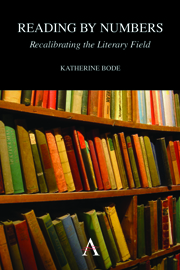Book contents
- Frontmatter
- Contents
- Acknowledgements
- List of Tables and Figures
- Introduction A New History of the Australian Novel
- Chapter 1 Literary Studies in the Digital Age
- Chapter 2 Beyond the Book: Publishing in the Nineteenth Century
- Chapter 3 Nostalgia and the Novel: Looking Back, Looking Forward
- Chapter 4 Recovering Gender: Rethinking the Nineteenth Century
- Chapter 5 The ‘Rise’ of the Woman Novelist: Popular and Literary Trends
- Conclusion Literary Studies in the Digital Future
- Notes
- Bibliography
- Index
Chapter 4 - Recovering Gender: Rethinking the Nineteenth Century
- Frontmatter
- Contents
- Acknowledgements
- List of Tables and Figures
- Introduction A New History of the Australian Novel
- Chapter 1 Literary Studies in the Digital Age
- Chapter 2 Beyond the Book: Publishing in the Nineteenth Century
- Chapter 3 Nostalgia and the Novel: Looking Back, Looking Forward
- Chapter 4 Recovering Gender: Rethinking the Nineteenth Century
- Chapter 5 The ‘Rise’ of the Woman Novelist: Popular and Literary Trends
- Conclusion Literary Studies in the Digital Future
- Notes
- Bibliography
- Index
Summary
Feminist criticism has had the single greatest influence in reshaping the nature of Australian literary studies, not only in its critique of the masculinism of the nationalist tradition and the established canon, but positively in the rediscovery of midcentury women writers and the recovery of colonial romance and autobiography genres.
Where feminism has clearly transformed Australian literary studies, the same cannot be said of publishing history. Despite some excellent analyses of publishing through a gendered framework, for the most part, as Mary Eagleton says: ‘Feminism's lack of interest in publishing history is equalled only by publishing history's similar disregard for feminism.’ Blackwell's recent A Companion to the History of the Book is a prime example of this ‘disregard’, including no dedicated discussion of gender in its almost 600 pages. The next two chapters aim to contribute to bridging this divide between feminism and publishing history by exploring, and demonstrating the profound interconnections between, publishing and gender trends in the history of the Australian novel. This analysis will also add another layer to the revised history already presented in Chapters 2 and 3, with this chapter focusing (like Chapter 2) on the nineteenth century, and the next one (like Chapter 3) considering the decades since the end of the Second World War. The connections that emerge between publishing and gender trends extend understandings of the history of authorship, publishing and reading in these periods.
- Type
- Chapter
- Information
- Reading by NumbersRecalibrating the Literary Field, pp. 105 - 130Publisher: Anthem PressPrint publication year: 2012

